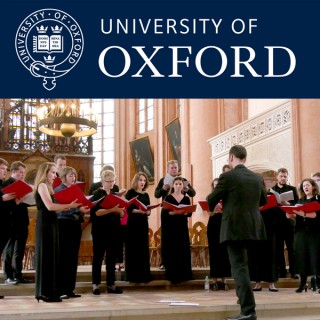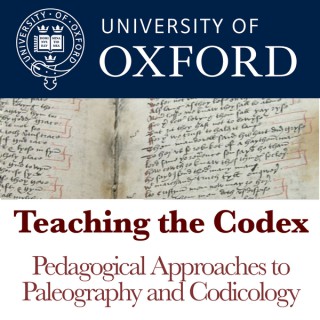Podcasts about henrike l
- 14PODCASTS
- 25EPISODES
- 39mAVG DURATION
- ?INFREQUENT EPISODES
- Dec 20, 2024LATEST
POPULARITY
Best podcasts about henrike l
Latest news about henrike l
- The Sword of Judith: Judith Studies Across the Disciplines AWOL - The Ancient World Online - Sep 25, 2023
Latest podcast episodes about henrike l
The often forgotten world of medieval nuns holds many secrets about the lives of ordinary people of the age, their daily routines, education, and societal roles. German medieval historian Henrike Lähnemann shares with Matt Lewis her research into the rich archives of convents, which revealed nuns' vibrant lives, from their involvement in local politics and commerce to their spiritual duties and family bonds. They discuss how medieval convents served as hubs of learning, medicine, and community interaction, complete with both solemn rituals and moments of joyful laughter.Gone Medieval is presented by Matt Lewis and edited by Amy Haddow. The producer is Rob Weinberg. The senior producer is Anne-Marie Luff.All music used is courtesy of Epidemic Sounds.Gone Medieval is a History Hit podcast.Sign up to History Hit for hundreds of hours of original documentaries, with a new release every week and ad-free podcasts. Sign up at https://www.historyhit.com/subscribe. You can take part in our listener survey here: https://uk.surveymonkey.com/r/6FFT7MK
The Life of Nuns: Luke Wilkinson interviews Henrike Lähnemann
Luke Wilkinson interviews Henrike Lähnemann, Professor of Medieval German Literature and Linguistics at the University of Oxford, to discuss her and Eva Schlotheuber's new book 'The Life of Nuns: Love, Politics, and Religion in Medieval German Convents' (Open Book Publishers, 2024). They discuss the ideas that circulated through the sounds and spaces of medieval German convents.
"Unerhörte Frauen." - von Henrike Lähnemann und Eva Schlotheuber eine Rezension von Rahel Micklich - Literaturkritik.de
"Unerhörte Frauen." - von Henrike Lähnemann und Eva Schlotheuber eine Rezension von Rahel Micklich - Literaturkritik.de (Hördauer 19 Minuten) Zwischen Tradition und Reformation, Selbst- und FremdbestimmungHenrike Lähnemann und Eva Schlotheuber schreiben über Nonnen im späten Mittelalter, über „Unerhörte Frauen“ und ihre Netzwerke der Liebe Scito quod nullis amor est medicabilis herbis – „Wisse, gegen die Liebe ist kein Kraut gewachsen!“ Nicht gegen die der Fürsorge für Kranke und Sterbende, um die sich die Lemgoer (Lüneburger, Medinger, Derneburger …) Nonnen liebevoll gekümmert haben, nicht gegen die, die sie allererst in Bewegung gesetzt hat; aber auch nicht gegen die, mit der dieses Buch verfasst worden ist und die auch seine Leser ergreift, die sich darauf einlassen. Diese (dem besprochenen Titel entnommene) um 1350 zu Zeiten der Pest entstandene Aussage aus einer medizinischen Handschrift des Dominikanerinnenklosters Lemgo reflektiert in mehrfacher Hinsicht, worum es im und dem Buch der beiden Autorinnen, renommierte Professorinnen aus Oxford und Düsseldorf, geht: Um viele Dinge, beeindruckend viele – „aber die Liebe ist die größte unter ihnen“. …“ Eine Rezension von Rahel Micklich, Den Text der Rezension finden Sie hier Sprecher Matthias Pöhlmann Schnitt Jupp Stepprath, Realisation Uwe Kullnick Hat Ihnen diese Rezension gefallen, mögen Sie vielleicht auch diese Sendung Kommen Sie doch einmal in unsere Live-Aufzeichnungen in München --- Send in a voice message: https://podcasters.spotify.com/pod/show/hoerbahn/message
Prof. Henrike Lähnemann und Prof. Eva Schlotheuber über "Unerhörte Frauen"
Mit Prof. Henrike Lähnemann und Prof. Eva Schlotheuber gehen wir bei DAS! auf historische Zeitreise ins Mittelalter: Wie haben dort die Menschen gelebt? Wie war ihr Alltag? Was wissen wir über die geheimnis- und machtvolle Gemeinschaft der Frauen in norddeutschen Klöstern? Die beiden Wissenschaftlerinnen haben ihre faszinierenden Einblicke jetzt im Buch "Unerhörte Frauen" zusammengefasst. Auf dem Roten Sofa erzählen sie von spektakulären Quellenfunden aus Tagebüchern und Briefen und darüber, wie Frauen im Mittelalter dachten, glaubten und liebten.
L.I.S.A. - Vox femina. Zeugnisse von Nonnen im Mittelalter
Ihre Stimmen verhallten hinter massiven Klostermauern - unzugänglich für die Nachwelt und damit dem Vergessen überlassen. Bis vor einigen Jahren, als im Zuge neuer Forschungen ein erstes Echo der lange Zeit stillen Frauen zu vernehmen war. Die Historikerin Prof. Dr. Eva Schlotheuber von Universität Düsseldorf und die Philologin Prof. Dr. Henrike Lähnemann von der University of Oxford haben in einem gemeinsamen Projekt alte Quellenbestände erschlossen und erforscht. Darin werden die lange Zeit ungehörten Stimmen von Nonnen im Mittelalter wieder lebendig. Stimmen, die bislang ungekannte Geschichten erzählen und ein neues Bild vom Alltag in mittelalterlichen Frauenklöstern bieten. Die beiden Mediävistinnen haben diese unerhörten Geschichten in einem gemeinsam geschriebenen Buch zusammengetragen. Für uns ein guter Grund, in einer neuen Ausgabe von Zu Gast bei L.I.S.A. mehr über die voces feminarum aus der mittelalterlichen Klausur zu erfahren. Den Originalbeitrag und mehr finden Sie bitte hier: https://lisa.gerda-henkel-stiftung.de/zugastbeilisa_schlotheuber_laehenmann_voxfemina_nonnen
Paradiesgarten, kein Knast: Nonnen und ihre Klausur - Gespräch Henrike Lähnemann
Dietrich, Kirstenwww.deutschlandfunkkultur.de, ReligionenDirekter Link zur Audiodatei
Henrike Lüers und Simon de Vries machen zusammen Kirche in Nordhorn - einmal ganz traditionell und einmal ganz anders. Mit uns reden sie über Sehnsucht, Offenheit, Kirche ohne Erwartungen, Schlichtheit und Augenhöhe. http://zwischenzeit-nordhorn.de
Second part of the masterclass: The Medingen Manuscripts in the Bodleian
Masterclass for the Leverhulme Doctoral Students with Henrike Lähnemann, filmed by Natascha Domeisen. All the manuscripts featured are available via digital.bodleian search 'Medingen' on https://digital.bodleian.ox.ac.uk/ for more details) O1 Oxford Easter Prayer-Book (c. 1500): Oxford, Bodleian Library, MS. Lat. liturg. f. 4 Community: fol. 174v (nuns and lay-people); fol. 28v (prayer for Lüneburg and the Abbess) Printing: fol. 141v (Glued-in maiden); fol. 217v (Glued-in lions); Musical Notation: fol. 90r / 283v-284r / 36v-37r Binding: Early 16th cent. roll with Venus, Prudentius and Lucretia O2 Manual for the Provost (1470s): Oxford, Bodleian Library, MS. Lat. liturg. e. 18 Community: fol. 1r (ownership mark of Medingen); Reworking: fol. 2/2* (added in songs with lay-participation) Musical Notation: 81v-83r / 49v-50r Binding: Late 15th cent. stamps with 19th cent. ownership plaque O4 Oxford Medingen Psalter (1510s-1530s): Oxford, Bodleian Library, MS. Don. e. 248 Community: fol. 7v (Obiit entry for Abbess Margarete Puffen), 20v-21r (punctus flexus) Reworking: fol. 18 (Low German replacement prayer), plaque in its 19th century setting Musical Notation: fol. 103r / 277v
For the launch of the Polonsky Foundation funded digitisation project of Manuscripts from the German Speaking Lands, Henrike Lähnemann (Oxford) talks about manuscripts from the Cistercian Abbey of Medingen (Lower Saxony). The manuscripts are now in Oxford, Hildesheim and Wolfenbüttel. More information https://hab.bodleian.ox.ac.uk/en/blog/blog-post-2/
A Historical and Practical Introduction to Miles Coverdale’s Goostly Psalmes and Spirituall Songes by Henrike Lähnemann, Chair of Medieval German Literature and Linguistics and Fellow of St Edmund Hall.
Henrike Lähnemann (Oxford) gives a talk at the 2016 Teaching the Codex Colloquium.
Relay Reading for the Launch of the Taylorian Pamphlet Series. Speakers in order they are reading: Henrike Lähnemann, Howard Jones, Nigel Palmer, Catriona Seth, Andrew Allen, Alexandra Lloyd, Helmut Kollig, Kathrin Luddecke, Ed Wareham, Alderik Blom, John Partridge, Johanneke Sytsema, Ulla Weinberg, Ewa Wegrzyn, Jennifer Bunselmeier, Brigitta Poppe, Christine Baro-Hone, Patrizia Zachhuber, Hans Hahn, Elsa Voak , Eleanor Voak , Charlie Louth, David Murray, Franziska Kohlt, Katrin Kohl, Hannah Jackson, Claudia Piller, Tiziana Imstepf, Emma Huber, Sophie Hall, Maren Fichter, Susanne Herrmann-Sinai, Lena Vosding, Martin Christ, John Flood.
Banned Books: Hus and Luther in the Teddy Hall Library
This talk focusses on a first edition of the collected works of Jan Hus, from the collection in St Edmund Hall’s Old Library, written in the fifteenth century but first printed in 1558 together with letters of recommendation from Martin Luther. This talk focusses on a first edition of the collected works of Jan Hus, from the collection in St Edmund Hall’s Old Library, written in the fifteenth century but first printed in 1558 together with letters of recommendation from Martin Luther. Henrike Lähnemann (Professor of Medieval German Literature and Linguistics) weaves together discussion of the book with the history of religious rebellion at the College, particularly alluding to Principal William Taylor who was condemned as a follower of Wycliffe and burned at the stake in 1423. She explains how the Old Library itself was founded in the name of reform.
A Tristan Tile in the Ashmolean
Henrike Lähnemann (Professor of Medieval German Literature) delivers a talk as part of the Creative Multilingualism and TORCH Bitesize Talks at Linguamania, Ashmolean Museum. Henrike Lähnemann (Professor of Medieval German Literature) delivers a talk as part of the Creative Multilingualism and TORCH Bitesize Talks at Linguamania, Ashmolean Museum.
A film by Alex Lloyd about the Oxford Bach Soloists' recent tour to Northern Germany as part of the knowledge-exchange project 'Recording the Reformation', led by Prof. Henrike Lähnemann at the University of Oxford.
Concert at the Mariensee Convent with the Oxford Bach Soloists
Concert at the Mariensee Convent with the Oxford Bach Soloists (A lecture-recital tracing the origins of Bach's Cantata 'Christ lag in Todesbanden' (BWV 4) at Mariensee Convent in Northern Germany. The concert was given as part of the project 'Recording the Reformation', a collaboration at the University of Oxford between Prof. Henrike Lähnemann and the Oxford Bach Soloists.
Trailer for 'Singing the Reformation' - a film about the Oxford Bach Soloists' tour to Northern Germany as part of the knowledge-exchange project 'Recording the Reformation', led by Prof. Henrike Lähnemann at the University of Oxford. With thanks to: James Beddoe, Caroline Halls, Tom Hammond-Davies, Katie Jeffries-Harris, Henrike Lähnemann, Felix Leach, Harry Meehan. Filmed at Kloster Mariensee, Germany. Camera: Jennifer Bunselmeier, Alex Lloyd. Sound: Elisabeth Kemper, Jennifer Bunselmeier Alex Lloyd.
Henrike Lähnemann on the Reformation publication of the ‘Juttenspiel’ Part of the Reformation lecture series for Paper VII: Dietrich Schernberg’s play about Pope Joan (“Jutta” in German) was published by two Lutheran ministers as part of a Lutheran anti-papal polemical campaign. The lecture discusses the background of the controversial story, early modern German drama and the Reformation debate around papacy.
Henrike Lähnemann on the popularity of the Judith theme in Reformation drama Part of the Reformation lecture series for Paper VII: Martin Luther's judgement of the apocrypha and his influence on the development of early modern drama in Germany; the Judith play by Joachim Greff and those by Sixt Birck and Hans Sachs
From Old High German via Martin Luther to Bibel in gerechter Sprache. A whistle stop tour of German Bible translation The joined presentation on Bible translation as 'Prism of Theology' was part of the Oxford Comparative Criticism and Translation annual conference, 'Prismatic Translation', on 1 -3 October 2015, St Anne's College, Oxford. Speakers: Howard Jones, Henrike Lähnemann, Daniel Lloyd. 1300 years of German Bible translation in one hour!
Masterclass Medingen Manuscripts: Henrike Lähnemann (Oxford): Introduction
Presentations about the Medingen Manuscripts Part 1 of 6: Masterclass on the occasion of the Inaugural Lecture of Henrike Lähnemann, held on Friday 22 January 2016 in the Lecture Theatre Weston Library. Website: medingen.seh.ox.ac.uk.
Round Table on the occasion of the Inaugural Lecture of Henrike Lähnemann Discussion, held on Friday 22 January 2016 in the Taylor Institution. With contributions by Prof. Dr. Hans-Jochen Schiewer (University of Freiburg), Dr Wilhelm Krull (VolkswagenStiftung), Dr Dorothea Rüland (DAAD), Prof. Katrin Kohl (Oxford German Network), Dr Carsten Dose (FRIAS), Chair: Prof. Ritchie Robertson (Taylor Chair of German Studies).
Launch of the Reformation 2017 Website Part 1 of 11: Presentations for the Launch of the Reformation 2017 website from German Studies staff and students and an address by the Cultural Attaché, Charlotte Schwarzer, German Embassy. blogs.bodleian.ox.ac.uk/taylor-reformation.
Henrike Lähnemann’s Inaugural Lecture for the Chair in German Medieval Literature and Linguistics. Lecture delivered on Thursday 21 January 2016 in the Taylorian Institute. The subject of the lecture is a new acquisition by the Bodleian Library in Oxford, a psalter written ca. 1500 by the nun Margaret Hopes in the Cistercian convent of Medingen near Lüneburg, MS. Don. e. 248. The hypothesis advanced is that the nuns use the materiality of their prayer-book as the embodiment of their devotion.
Crossing Boundaries: Medievalists in Cross-Disciplinary Conversation
Launch event for the TORCH programme Oxford Medieval Studies The launch event for the TORCH programme Oxford Medieval Studies included speakers: Emma Dillon (Professor of Music, King's College London); Henrike Lähnemann (Chair of Medieval German Literature and Linguistics, University of Oxford); David Wallace (Judith Rodin Professor of English, University of Pennsylvania); and Chris Wickham (Chichele Professor of Medieval History, University of Oxford).

















